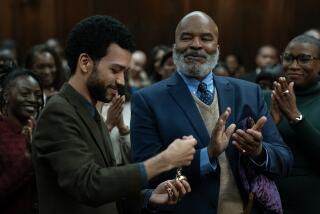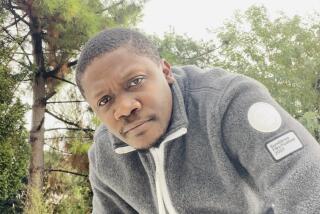Dwarf carves a niche in spotlight
LAGOS, NIGERIA — When Israel Akiode became a Nigerian television soap opera actor, people would follow him wherever he went, shouting and laughing with excitement.
All his life people had been following him, shouting and laughing, but there was a difference. This time, they were on his side.
As a dwarf, Akiode grew up with taunts and laughter echoing in his ears. When he was a boy, people chased him, throwing stones, grabbing him, touching him, hitting him.
“Because we are short they say, ‘This one’s a demon.’ When they see us, they just get scared,” said Akiode, 46. “People were always looking at me. People were following me. They called me names, like Ousa.” He found out it meant “strange person.”
“At first I felt bad. But later I got used to it. It became my nickname.”
After enduring years of cruel teasing, Akiode became famous thanks to a chance role in a television soap opera. Akiode, who played a clown, was struck with the way fame changed people’s attitudes overnight.
So he founded a dwarfs association more than a decade ago to represent the rights of people like him.
“We are being marginalized by tall people,” he said. “We feel we’ve been cheated.”
People affected with dwarfism face entrenched discrimination in Nigeria, where superstitions are common. They are often seen as gnomes or demons and may be rejected by their parents, bullied at school and seen as unemployable. Many end up as beggars or outcasts.
Akiode learned as a boy how to quickly defeat a bigger opponent.
“When they started fighting me, I’d butt them with my head and two or three teeth would go,” he said, describing how he would swing his head up sharply, catching his enemies under the chin. “I’d fight to the last. Either I’d remove their teeth or I’d injure them.
“I was so stubborn and unforgiving when I was young.”
If there was one theme that colored his life, it was the constant shadow of rejection.
“Sometimes I wondered if it was God who created me, or the devil,” he said. “I was always asking myself that question.”
At 17, he fell in love with a girl, who rejected him, the first of a long line of romantic disappointments that would continue for two decades.
“They’d just say, ‘Me? Marry you? Go! Go! Go!’ It wasn’t easy, because they would go and tell the others that they had rejected you.”
And then there was the horrified reaction of a girl named Elizabeth, whom he secretly admired at church on Sundays. She blanched at his proposal of marriage.
“I said, ‘No, no, no!’ Because he’s a dwarf,” Elizabeth recalled.
Nine years on, her surname is Akiode and they have a son, Emmanuel, 8.
When they met, she laughed him off, but he was persuasive.
“I said, ‘What tall people can do, short people can do even better.’ ”
In time, he convinced her. But her parents bitterly opposed the match, insisting that he break the relationship.
“I just stood back. I stayed away from her. I didn’t want her to disobey her family. Later, she came back on her own.”
Akiode got a diploma in mass communication, but it did not make him attractive to employers. He decided to be an actor after many rejected applications for jobs.
“Do you want to employ this man?” he remembers one secretary audibly hissing to her boss. “People will be fleeing from our office.”
“When I came back from one of those interviews, I felt so bad. I prayed to God to raise me up and put me through.”
In 1983, the 22-year-old Akiode got his break when he ran into an acquaintance working on a Nigerian soap opera, “Village Headmaster,” who asked him to come and watch the filming.
Akiode was offered a role as a clown and from there moved on to another soap opera, before playing in many movies in Nollywood, Nigeria’s film industry.
In the film and television world, he has taken advantage of the prejudices and misconceptions he’d suffered all his life: He adopted his nickname from school, “Ousa,” as his stage name.
“The first show I ever did, people were shouting at me, saying, ‘It’s the short man! I saw him on TV!’ They were shouting more than ever, but they were shouting in a good way.”
In 1996 he founded the Dwarf Assn. of Nigeria. His idea was to use the organization to make films depicting dwarfs in positive roles.
He went all over the country looking for people like him, vowing to improve their lives.
“I went from one village to another in search of dwarfs. Sometimes their parents would release them to us. They’d say, ‘Go and meet your people. Don’t be a liability to us anymore.’
“The other dwarfs had had worse experiences than my own. Some of them didn’t have shoes. Some did not go to school. Some had bad clothes. Some when you saw them, they were smelling like rats.”
Sefiu Adekunde was working at his uncle’s sawmill under the Third Mainland Bridge in Lagos when Akiode found him. Like Akiode, he’d been shunned most of his life.
His parents had rejected him when he was born. His grandmother brought him up.
“People would not want to hire me. I’d have to dance around and create some excitement to get them to hire me. I’d hop from one log to another to show them I could do it,” Adekunde said.
When Akiode explained the goal of the association, Adekunde’s uncle told his nephew that he should leave and join the other dwarfs because he had little future at the mill.
The organization now has 42 members, many of whom have appeared in the four films the group has made in the last decade.
Some of the films are semi-autobiographical stories of the lives of dwarfs and the prejudices they face. One, “The Missing Dwarfs,” is a thriller about criminals who kidnap dwarfs for use in magic rituals. Its hero is a dwarf who rescues the prisoners. The association is planning a new film called “The Wicked Stepmother.”
After making its first film in 1996, the association approached a distributor, who rejected the film, saying it would never find an audience.
Unfazed, the group took to the streets of Lagos, Nigeria’s commercial capital, going from car to car on the streets to sell copies of the film. Akiode said the group had sold 20,000 copies of a later film this way. The film, “Ndaicobas,” is about a dwarf who is disinherited by his father and is helped by a band of dwarfs to reclaim his rightful legacy.
But weaving through Nigeria’s crazy traffic, selling DVDs at car windows, is a tough way for anyone to survive.
Adekunde has had some close calls with buzzing motorbikes whose riders did not see him. He can’t run beside a moving car to collect his cash like most other traffic traders, so he leaps, hooking an elbow into the car window and hanging from the moving vehicle.
Not a day goes by, he said, when he doesn’t face the same old taunts and abuse.
“I thought joining the association and starring in films would add some fame and wealth to my pocket,” Adekunde said. “It has not really been so.”
It’s an uphill struggle. There is no money for a new film, so the only way to survive is to keep selling the old ones wherever buyers can be found.
“We started from Lagos and went from state to state, farther and farther. We’re not making enough money,” Akiode said, but hopes to gain more exposure for the group.
At times, there’s an edge of desperate opportunism, looking for the next chance to exploit. Asked where other dwarfs could be found for interviews, Akiode said they were in a distant state and had requested that their fares to Lagos be sponsored. It later emerged that his assertion was untrue.
Even harder than the daily grind of roadside selling, there is the long struggle to change attitudes.
Akiode said that Emmanuel, his son, who is also affected by dwarfism, does not face the same abuse that Akiode knew as a boy. Yet Emmanuel still suffers.
“He asked me many times, ‘Why am I like this?’ But it’s happened. You can’t change it.”
Four small films might not be enough to transform a society of 140 million people. But it’s a start, Akiode said.
“We have shown them that we are not demons, not people to look down on,” he said. “It’s God [who] created us.”
More to Read
Sign up for Essential California
The most important California stories and recommendations in your inbox every morning.
You may occasionally receive promotional content from the Los Angeles Times.










